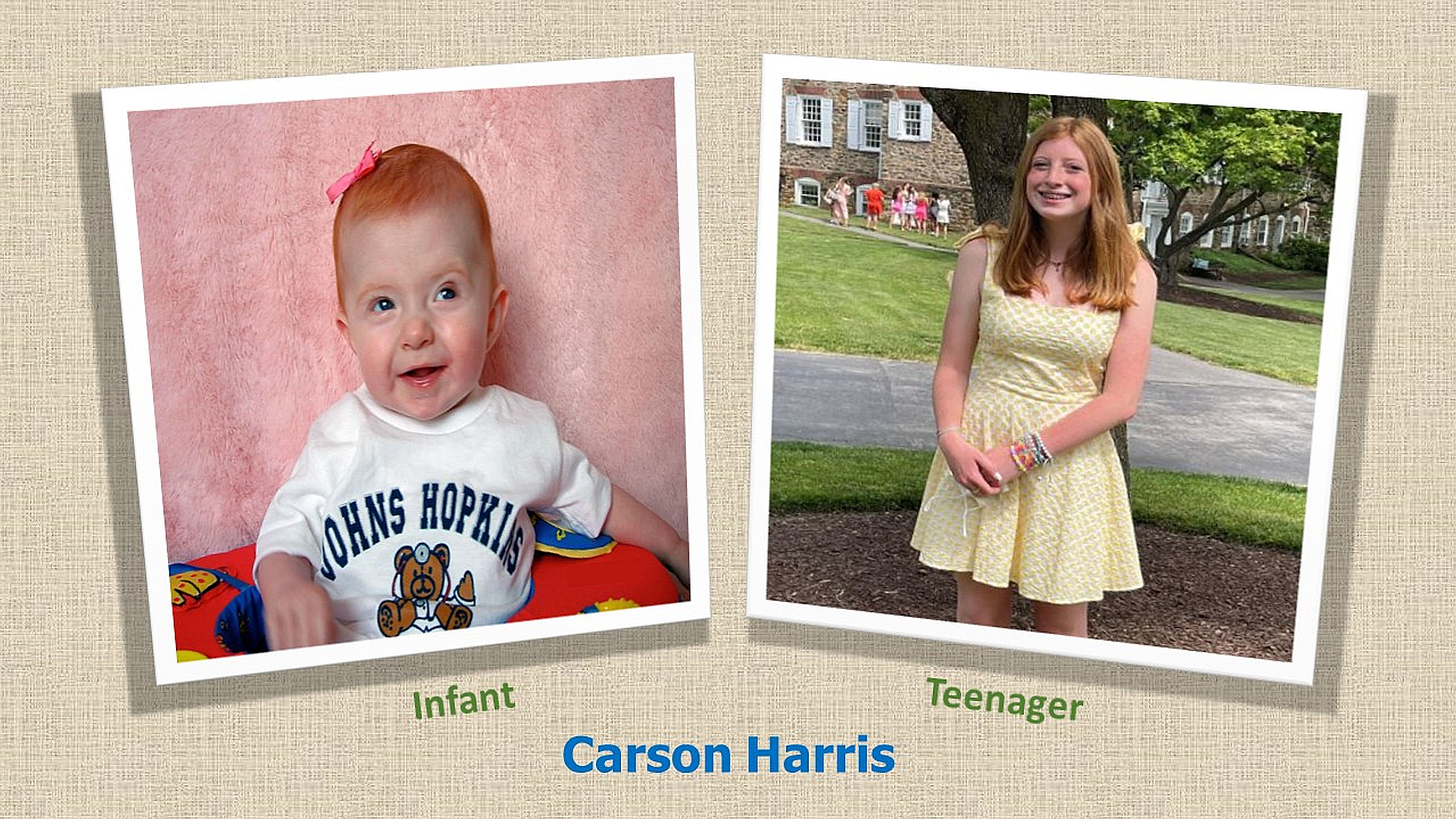Johns Hopkins Children’s Center Patient Became Seizure Free Thanks to Ketogenic Diet
07/15/2021

Carson Harris, age 14, of Glen Arm, Maryland, doesn’t remember the seizures she had as a baby. She doesn’t remember how frightened her parents, Gerry and Michael Harris, were as they watched their daughter spasm uncontrollably. Carson only hears the stories about what was one of the scariest times in her parents’ lives.
In February 2007, 5-month-old Carson was a healthy baby and hitting normal growth milestones, her parents say. Then, the seizures started. Carson’s legs and arms would tighten, and her eyes jerked to the side of her head repeatedly. The seizures “lasted about a minute, and 15 to 20 minutes later, she would go into another cluster,” Carson’s mother recalls. Doctors with the Pediatric Ketogenic Diet Center at Johns Hopkins Children’s Center (JHCC) diagnosed Carson with an uncommon form of epilepsy called infantile spasms (IS).
IS can occur due to causes such as brain malformations, infections, brain injury or abnormal blood vessels in the brain. The spasms typically start suddenly, last a second or two each, and are clustered together for several minutes. The spasms rapidly increase over days.
After Carson’s spasms began, her parents were told she would have about a 20% chance of becoming seizure free and developing normally. They were offered a variety of treatments commonly used for epilepsy, including a steroid regimen that can have side effects such as weight gain and high blood pressure. Another option was the classic ketogenic diet, a therapy involving the consumption of high-fat foods, moderate proteins and few carbohydrates. Johns Hopkins Medicine has been a pioneer in research and clinical use of the therapy for most of the diet’s 100-year history (the centennial occurs July 27, 2021).
“Ketogenic diet therapy essentially burns fat for energy, which prevents further seizures for many patients,” says Eric Kossoff, M.D., medical director of the pediatric ketogenic diet program and Carson’s neurologist. “The diet is extremely strict, with all food and liquid that a child ingests being weighed carefully.” For babies like Carson, ketogenic diets are provided as infant formulas.
Parents are instructed how to measure their child’s intake. Pediatric patients are admitted to the hospital before starting the diet, and then have regular follow-ups with their doctor.
Less than a week after her first seizure, Carson’s parents decided to start with the ketogenic diet before trying medication. “This was a unique situation in which the diet works just as well as steroids in many infants, and Johns Hopkins had tried this approach before with previous patients,” Kossoff says.
Carson was admitted to JHCC on Saturday, began the diet the next day and had her last seizure that Tuesday night. “It was all the diet,” says her mother. “We never used one medication. It was amazing.”
Carson left the hospital on Thursday that same week and continued the diet for eight months. Because of her seizures before the diet, Carson had brief delays in her physical development, but mentally, she was ahead of her age level. “She was very smart,” says her mother.
Eventually, there was no trace of any delays, and Carson began reaching all of her developmental milestones.
In October 2007, Carson’s mother started a ketogenic diet support group at JHCC. Now, more than 13 years later, she continues to arrange meetings each month with parents whose children are admitted to begin ketogenic therapy.
“When my daughter was starting the diet, I felt like the only ones who could relate were the people that we met at Johns Hopkins,” says Gerry Harris. “I thought [forming the support group] would be another way to give back.”
Carson’s family also created the Carson Harris Foundation, which has raised more than $275,000 for the Pediatric Ketogenic Diet Center at JHCC.
Carson, who is now almost 15 years old, has been seizure free since 2007. She graduated from the eighth grade in May of this year and enjoys many hobbies, including painting, writing, and playing tennis and volleyball. While she doesn’t recall her seizures, she understands how traumatic they were for her family, and the difference that the diet made in her recovery.
“It’s like, wow, I actually did experience it,” Carson says. “It’s crazy to think about.”
Kossoff, as well as Carson and her parents, are available for interviews.
